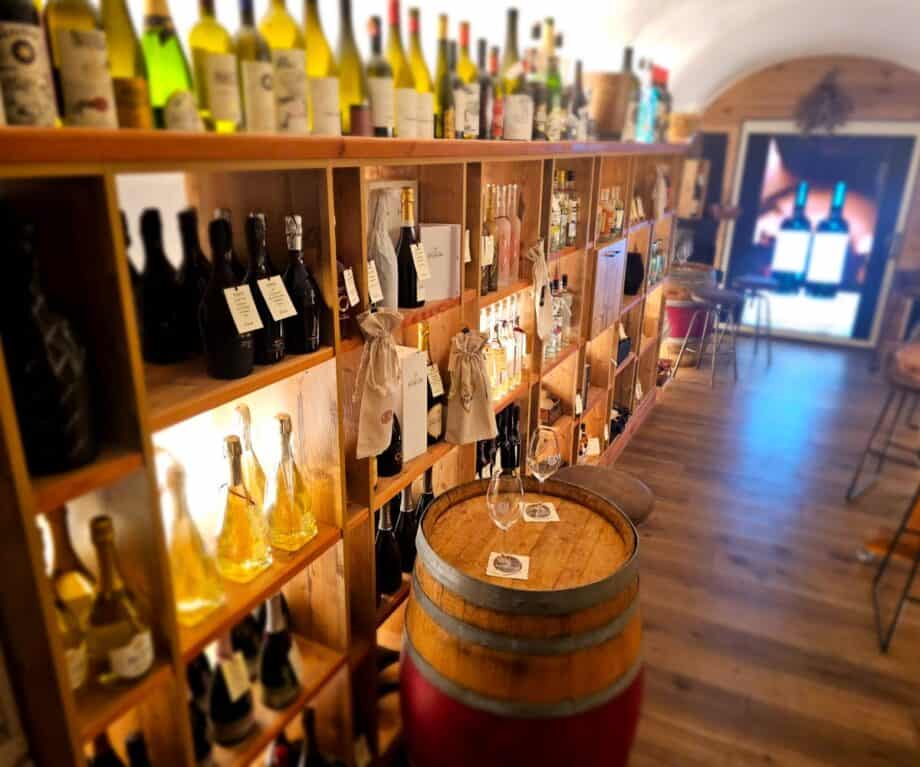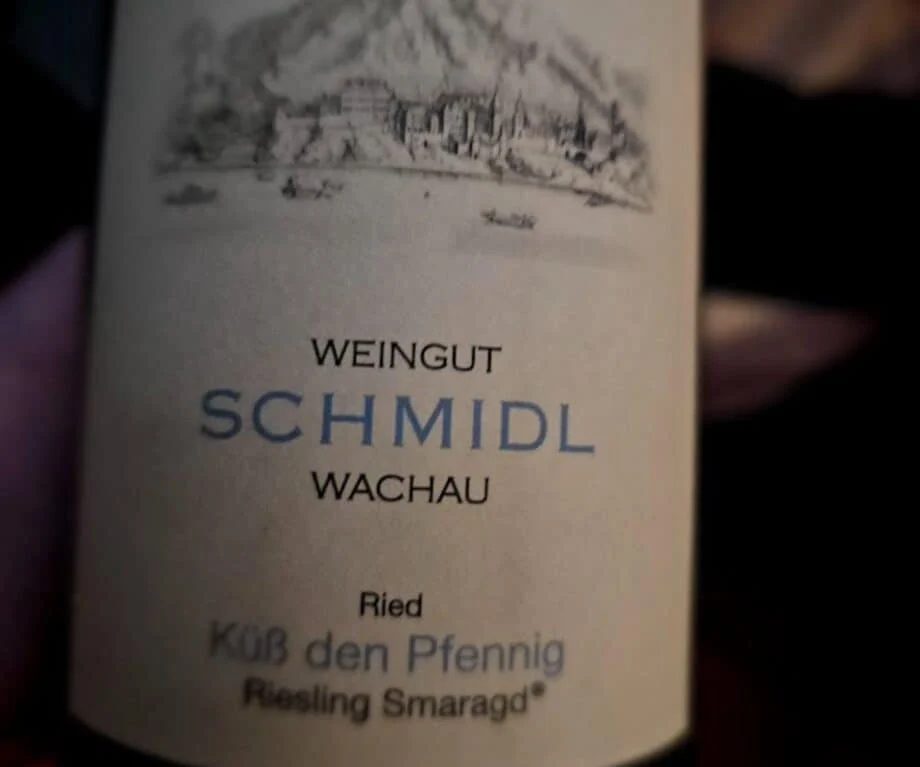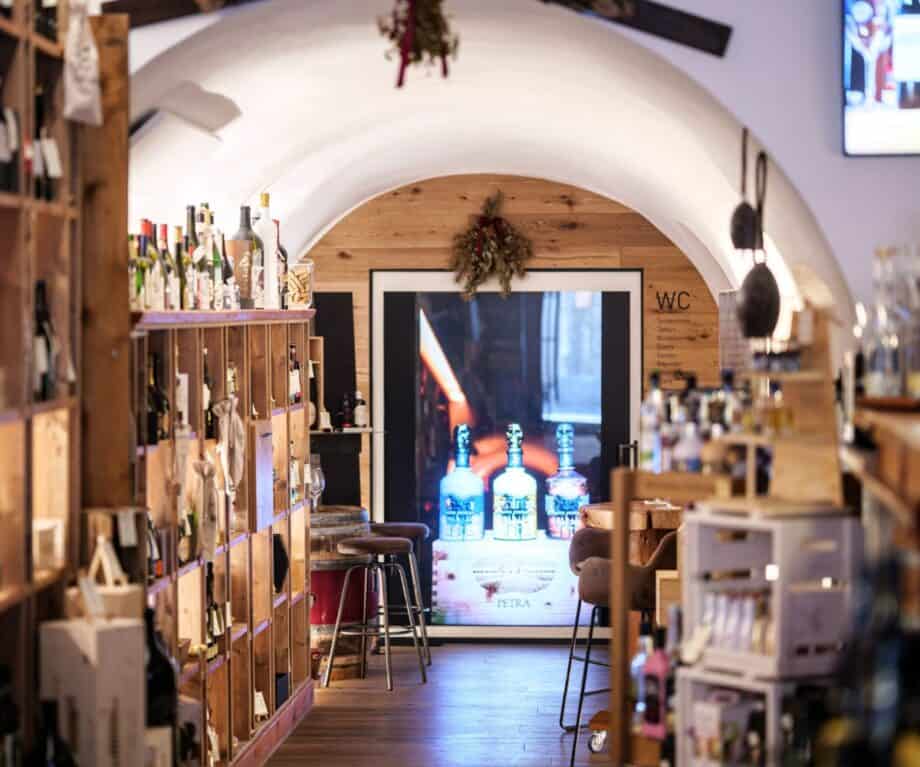Hidden in plain sight in Innsbruck, Weinhaus Tyrol is known to locals but still flying under the radar of most tourists. It’s the kind of place you dream of stumbling upon, and offers an intimate private dining and wine tasting experience.
Inside, there’s an extensive display of wines, a bar and occasional barrels used as make-shift tables to enjoy a drink or two.
At the end of this corridor and down a few steps, is a small converted cellar. With its arched ceiling, stone walls half-clad in plaster and dimly-lit ambience, it exudes a rustic charm and enjoys various quaint details.
Now I don’t profess to be a wine connoisseur, but I do enjoy a glass or two, and here we were in for a treat – this wasn’t just a dinner and a few glasses of wine, but an invitation to slow down, savour and be immersed into the culinary soul of Tyrol.
A member of staff introduces our first wine to us – it’s the Schmidl Grüner Veltliner Steinfeder Ried Alte Point. The Schmidl winery is a traditional family-run estate in the Wachau, known for its respectful approach to nature and its pursuit of the highest quality. The family cultivates their vineyards in a natural way and relies on sustainable farming methods to reflect the unique terroir of the Wachau. It’s light and fresh with notes of green apple, citrus fruits, and a hint of white pepper.
A generous spread of local cheeses, a selection of perfectly cured meats and a basket of bread are brought through for us to enjoy our wines with, arranged with a rustic elegance that spoke of tradition rather than showmanship, but was nevertheless delicious.
Next up is the Müller Thurgau (a cross between Riesling and Madeleine Royale) from Weinhof Tangl, one of only 13 official wineries in Tyrol. It’s fruity and aromatic with aromas of nutmeg, pear and fresh herbs. The climate in Tyrol differs significantly from that of its southern neighbour. Despite having the same amount of sunshine hours as many cities in South Tyrol, the region experiences more frost nights, which greatly influence grape ripening and wine structure. Weinhof Tangl has been passionately run by the family for generations and their focus is on a harmonious blend of tradition and innovation.
Our third white wine of the evening is another from the Schmidl winery – a Schmidl Riesling Smaragd Küss den Pfennig. Powerful and complex, it has aromas of ripe peach, apricot and a fine minerality. The Schmidl winery is renowned for its excellent Rieslings, which reflect the unique terroir of the Wachau. The name “Küss den Pfennig” (“Kiss the Penny”) refers to a centuries-old tradition and the great value the family places on every detail of wine production.
At this point, the cheese platter – adorned with grapes, figs and wlanuts – offers a welcome balance, helping to complement the wine and absorb some of the alcohol. Tyrol is renowned for its exceptional dairy products, particularly cheeses like Tiroler Bergkäse. The superior quality is largely due to the cows grazing on the pristine mountain pastures, which enhance the flavour of the milk.
Our next wine hails from the only winery located in a European capital city — the Edelmose winery in Vienna which has a history of over 600 years. Since the Middle Ages, winemaking has been pursued there with great dedication, with historic vineyards situated on the foothills of the Vienna Woods. The unique location in the heart of a vibrant city creates an unmistakable terroir and makes Edelmose a true institution in Viennese winemaking. The Edelmoser Rosé de Vienne is made from Zweigelt and Pinot Noir grapes – it’s fresh and fruity with aromas of red berries, cherry and a hint of floral notes.
And then it’s on to our first red of the evening with the Ernst Zweigelt Deutschkreuz (Zweigelt is an Austrian cross between Blaufränkisch and St. Laurent, known for its fruit-driven and spicy red wines with soft tannins). The Ernst winery is located in Deutschkreuz, the heart of Blaufränkisch country in Burgenland, and is known for its characterful red wines. The Ernst family focuses on natural cultivation, sustainable wine production, and authentic wines that perfectly reflect the region’s terroir. The Seewinkel region is characterized by unique geological and climatic conditions that are of great importance for viticulture. The seasonal drying of the saline lakes creates specific soil conditions that impart a mineral and salty note to the wines. It’s bold and spicy with notes of dark cherries, berries and a subtle touch of vanilla.
It seems there’s another wine waiting for us, but by now, we’ve had our fill. Each wine had been exquisite but what made the experience truly special was the ambience and sense of exclusivity, and – of course – good company. For anyone visiting Innsbruck, Weinhaus Tyrol is an absolute must-visit.
Disclosure: Our trip was sponsored by Innsbruck Tourism.
Did you enjoy this article?
Receive similar content direct to your inbox.












